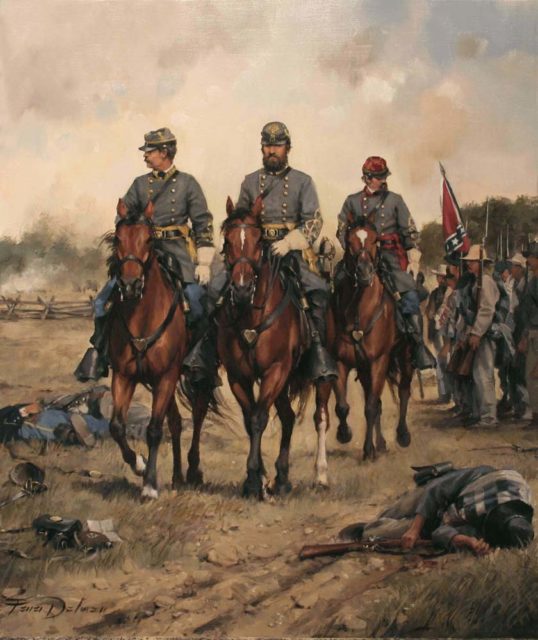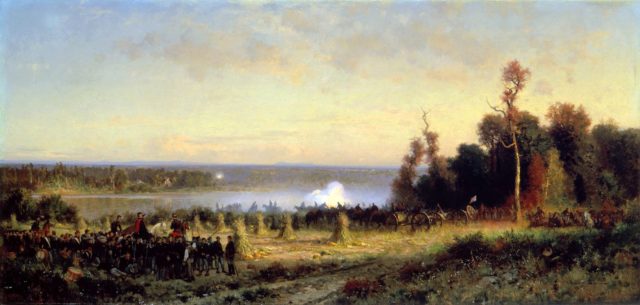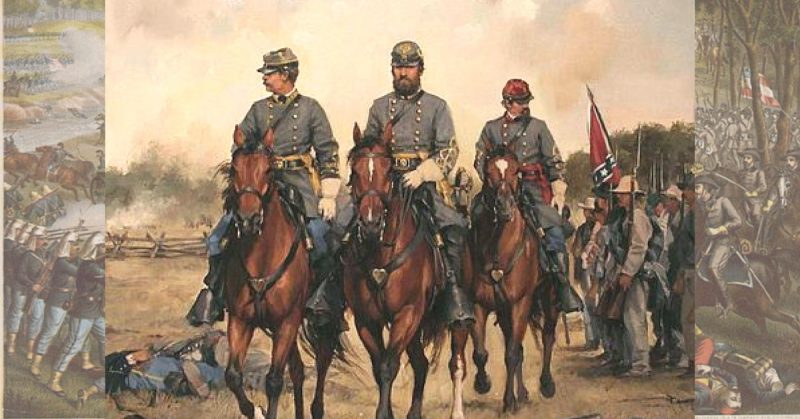General Thomas J. “Stonewall” Jackson was one of the most successful and eccentric commanders of the American Civil War. Despite a religious and personal fervor that bordered on madness, he achieved repeated victories for the Confederacy. Such was his flair that General Lee made him his chief lieutenant in commanding the Confederate cause.
What made Jackson so great?
Hard Work
A willingness to put in the effort made Jackson who he was. Despite a lack of proper schooling, he earned a place in the military academy at West Point in 1842. He lacked the education of most of his peers, being at the bottom of the class when he arrived.
Jackson worked hard at West Point, determined to make up for the knowledge he lacked. By the end of his training, he had become so accomplished he earned the right to serve in whichever branch of the army he wanted. Like that other great military commander, Napoleon, he chose to go into the artillery.
Discipline
Jackson was dedicated to discipline, a characteristic deeply tied to his fierce religious faith. It gave him the determination to stick with whatever task was presented and to pursue it to the absolute best of his abilities. It also meant no indiscipline was tolerated in the troops he led – a soldier either met the standards or he did not, there was no middle ground.

This dedication to discipline and strict sense of right and wrong could go too far. Jackson became embroiled in legal disputes with fellow officers. He frequently court-marshalled officers who did not live up to his strict standards. On several occasions during the Civil War, he led troops into battle while officers still had these cases hanging over them.
For all the problems it brought, this discipline helped both Jackson and those around him to achieve more.
Concern for his Men
Jackson’s strictness could seem cruel, but it did not reflect a lack of care for his troops. Far from it. He made sure they were supplied with the food and comforts they needed to make war bearable. After a battle, he looked to the needs of his injured soldiers.
Thanks to this attention to their wants, he was popular with his men despite his harsh discipline. It could be argued that tied with consistent care; the discipline became part of his appeal. The certainties of a firm leader and clear boundaries create psychological security, whether in the classroom or the army. Like a good teacher, Jackson made sure his troops knew where they stood.
Calm Under Fire
Jackson’s self-discipline extended from his daily life onto the battlefield. Calm and collected in the face of even the fiercest attacks, he could keep control of his troops when everything else was falling to pieces.
This was famously demonstrated at the First Battle of Bull Run. There he earned his nickname of Stonewall as he and his men stood firm amid an army on the verge of collapse. As General Bee said while trying to rally his troops, “There is Jackson, standing like a stone wall.”
Control of Fire
Bull Run also gave Jackson a chance to show another of his skills – control of firepower. His hard work training as an artillerist paid off, as he directed the fire of his brigade in a focused and effective manner against the Union troops. As the Union soldiers approached, Jackson ordered his men to hold their fire, launching a devastating volley at 50 yards before charging in with bayonets.
Leading from the Front
As a senior commander, it would have been easy for Jackson to take a back seat. That did not suit his courageous and sometimes bloodthirsty character. At Bull Run, he was among his men holding fast on the line. On Sitlington Hill at M’Dowell, he was part of the hand-to-hand fighting.
Personal courage allowed Jackson to take risks and inspire his troops to similar acts of courage.
Brutal Determination
Driven by the certainty of his God-given righteousness, Jackson was determined not only to thwart the enemy but to crush them utterly. As in his interest in artillery, it was a characteristic he shared with Napoleon. Also like Napoleon, it led him to occasional failures as well as success.

Jackson’s advance on the Potomac in January 1862 showed both sides of this characteristic. Driving his men on through freezing temperatures and driving snow, he made advances against all the odds, cutting communication lines and taking territory abandoned by the Union.
However, the extremes to which he pushed his troops created dissent. In the middle of the month, his men refused to press on any further, and he was forced to pull back.
Trickery
Although rigidly upright in his personal dealings, Jackson was not above using trickery to win the war. In fact, he had a gift for deceptive maneuvers.
In the Shenandoah Valley in the spring of 1862, he distracted, deceived, and outmaneuvered Union forces. Marching two whole brigades north up the east side of the river, he moved them away from the river through the Blue Ridge. Then using road and rail, he rushed them back south, ready to surprise his opponents at M’Dowell.
Swift Movement
Such deceptions were made possible by Jackson’s quick maneuvers. Confident in his abilities and strict in his expectations of his troops, he marched them at a swift pace around the country. It allowed him to outflank Banks, the Federal commander, during an advance on Winchester. The capture of that town and its supplies was not just a victory in itself; it also diverted 20,000 Union troops away from an advance on Richmond.
Source:
Richard Holmes, ed. (2001), The Oxford Companion to Military History.
David Rooney (1999), Military Mavericks: Extraordinary Men of Battle.
